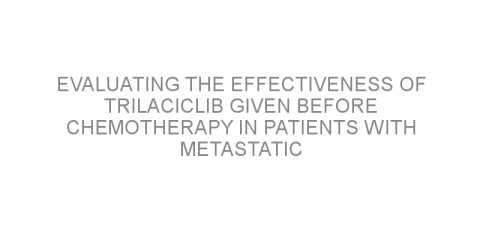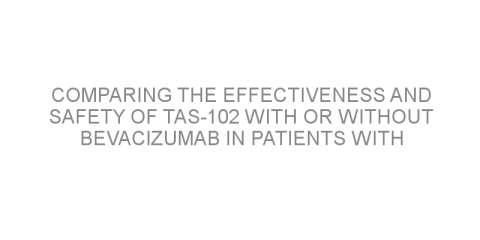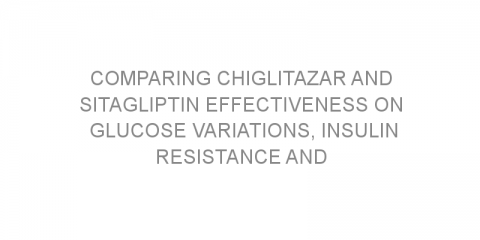In a nutshell This study evaluated the effectiveness and safety of ropinirole (Requip) for the treatment of patients with Parkinson’s disease (PD). The data showed that ropinirole was effective in improving motor function and daily living of patients with PD but was associated with an increase in side effects. Some background Parkinson's...
Read MoreTreatment Posts on Medivizor
Evaluating the effectiveness of immunotherapy in advanced lung cancer with and without brain metastases.
In a nutshell This study evaluated the effectiveness of immunotherapy in advanced lung cancer (LC) patients with and without brain metastases (BMs). The data showed that immunotherapy significantly improved overall survival in LC patients with and without BMs. Some background In 20-40% of patients with advanced LC, the cancer spreads from the lung to...
Read MoreEvaluating the effectiveness of trilaciclib given before chemotherapy in patients with metastatic triple-negative breast cancer.
In a nutshell This study evaluated the effectiveness of trilaciclib (Cosela) given before gemcitabine (Gemzar) plus capecitabine (Xeloda) (GC) chemotherapy regimen in patients with metastatic triple-negative breast cancer (mTNBC). The data showed that trilaciclib given before GC chemotherapy regimen was effective and significantly improved overall...
Read MoreComparing the effectiveness and safety of TAS-102 with or without bevacizumab in patients with metastatic colorectal cancer.
In a nutshell This study evaluated the effectiveness and safety of bevacizumab (Avastin) plus TAS-102 (Lonsurf; trifluridine-tipiracil) versus TAS-102 alone for the treatment of patients with metastatic colorectal cancer (mCRC). The data showed that bevacizumab combined with TAS-102 was effective with manageable side effects in improving the outcomes...
Read MoreWhich sequence of treatment should be given first – local or systemic treatment for patients with non-small cell lung cancer and brain metastases?
In a nutshell This study evaluated which sequence of treatment should be given first, local or systemic (whole-body) treatment for patients with non-small cell lung cancer (NSCLC) and brain metastases (BMs). The data showed that systemic treatment followed by local treatment was associated with longer survival for patients with NSCLC and BM. Some...
Read MoreEffects of combined treatment with selinexor, carfilzomib and dexamethasone once a week in patients with relapsed/refractory multiple myeloma
In a nutshell This study evaluated the safety and effectiveness of selinexor (Xpovio) in combination with carfilzomib (Kyprolis) and dexamethasone (Decadron) (XKd) in patients with relapsed/refractory (r/r) multiple myeloma (MM) that still responded to carfilzomib. The data showed that weekly administered XKd was highly effective and...
Read MoreComparing chiglitazar and sitagliptin effectiveness on glucose variations, insulin resistance and inflammation levels in patients with type 2 diabetes.
In a nutshell This study compared the effectiveness of chiglitazar (Bilessglu) and sitagliptin (Januvia) on glycemic (blood glucose) variations, insulin resistance, and inflammation levels in patients with type 2 diabetes (T2D). The data showed that chiglitazar treatment was more effective at improving insulin resistance and inflammation compared...
Read MoreIs chemotherapy after surgery followed by atezolizumab a good treatment option in patients with early stage non-small-cell lung cancer?
In a nutshell The study aimed to investigate the effectiveness and safety of atezolizumab (Tecentriq) versus best supportive care after chemotherapy in patients with resected early-stage non-small-cell lung cancer (NSCLC). The study showed atezolizumab is effective and has better outcomes than best supportive in these...
Read MoreEvaluating therapies after CAR-T Cell treatment in patients with relapsed and refractory ALL
In a nutshell The study aimed to investigate if allogeneic hematopoietic stem cell transplant (alloHSCT) was a suitable treatment strategy for patients with relapsed/refractory (r/r) acute lymphoblastic leukemia (ALL) after chimeric antigen receptor (CAR) T-cell therapy. This study concluded that this was a suitable treatment...
Read MoreTreating chronic lymphocytic leukemia/small lymphocytic lymphoma with rituximab and high-dose methylprednisolone
In a nutshell This study aimed to investigate using rituximab (Rituxan) and high-dose methylprednisolone (HDMP; Medrol) as a treatment for chronic lymphocytic leukemia (CLL)/small lymphocytic lymphoma (SLL). This study concluded that this treatment is a good option for elderly and frail patients and can work as a bridge to...
Read MoreTreating chronic lymphocytic leukemia/small lymphocytic lymphoma with rituximab and high-dose methylprednisolone
In a nutshell This study aimed to investigate using rituximab (Rituxan) and high-dose methylprednisolone (HDMP; Medrol) as a treatment for chronic lymphocytic leukemia (CLL)/small lymphocytic lymphoma (SLL). This study concluded that this treatment is a good option for elderly and frail patients and can work as a bridge to other lines of treatment....
Read MoreCan osimertinib be used as first-line therapy in older patients with EGFR-mutated NSCLC?
In a nutshell This study evaluated the effectiveness and safety of osimertinib (Tagrisso) as first-line therapy for older patients above 75 years with epidermal growth factor receptor (EGFR)-mutated non-small-cell lung cancer (NSCLC). The data showed that osimertinib as first-line therapy is effective in these patients. However, osimertinib was...
Read More














